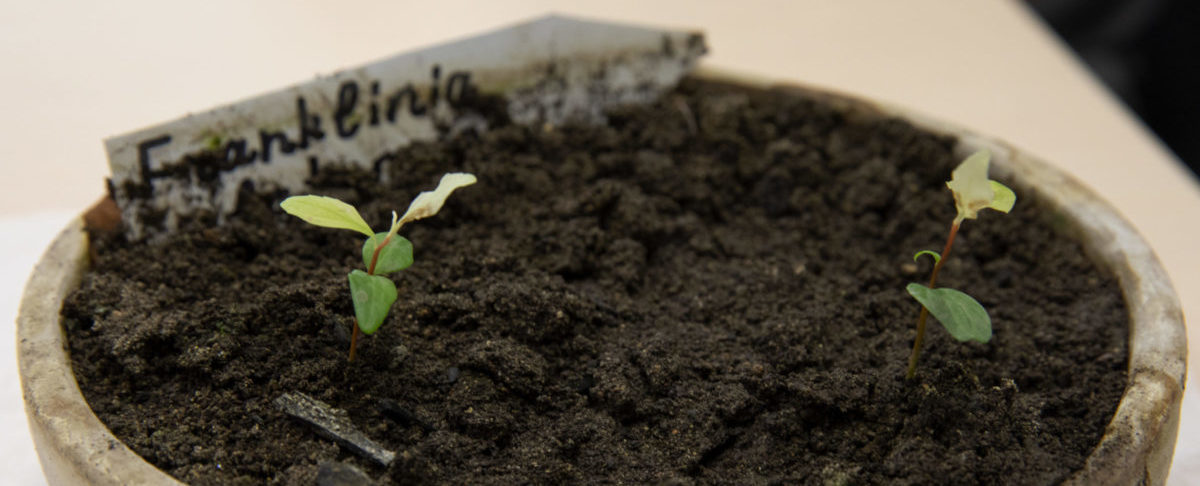THE FOUNDATION
Fondation Franklinia is a private foundation established in 2005 under Swiss law. It provides grants to support nature conservation projects. Its objective is to preserve threatened tree species throughout the world and improve their conservation status.
Since its creation, the foundation has been supporting primarily concrete on-the-ground conservation projects but also the establishment and maintenance of botanical collections, taxonomic studies, production of floras, compilation of lists of threatened species, reintroduction programmes as well as ex-situ conservation actions undertaken by botanical gardens.
Today, it supports primarily in situ conservation actions of globally threatened tree species around the world, species listed as Critically Endangered, Endangered and Vulnerable on the IUCN Red List of Threatened Species. To ensure that all tree species are assigned a threat category, the foundation also supports the global assessment of all 60’000+ tree species (Global Tree Assessment), an initiative led by Botanic Gardens Conservation International and the Global Tree Specialist Group of the IUCN Species Survival Commission.
The foundation is governed by a Board with the support of an Experts Committee who provides technical advice on projects. In 2018, a permanent Secretariat was established and based in Geneva; it implements the foundation’s strategy and manages daily operations.
WHY TREES ?
So many foundations focus their efforts on charismatic animal species whilst plants attract much less funding, in spite of the fact that they support most forms of life on the planet. By focusing on trees, Fondation Franklinia contributes to a better balance of funding and fills a unique niche which meets the need of a large number of nature conservation NGOs.
Trees represent a unique gateway for conservation projects. They represent the largest part of earth biomass and they can be found in most regions of the world. More than 60’000 species have been described compared to approximately 6’000 mammal and 10’500 bird species. They form the most diverse habitats on the planet and host a number of other species (epiphytic plants, fungi, birds, mammals, invertebrates, amphibians, reptiles…). Their protection will lead to enormous benefits for numerous other species and for wildlife in general. Numerous nature conservation projects also include a significant tree planting component as part of their work.
Even in the middle of cities we look for trees and enjoy their majestic presence, the beauty of their foliage and the shade they provide us. Without them, cities would be much less enjoyable and landscapes would be very different. Some are sacred, but all play a vital role in carbon sequestration which has become so important today, as well in soil stabilization, water filtration and fruit production. The preservation of forest ecosystems is a major challenge for the protection of biodiversity, indigenous peoples and the reduction of greenhouse gas emissions.
Unfortunately, many people just see trees as a source of wood. For some, there is a need to meet basic needs in charcoal or building material but others are looking purely for profit by meeting the growing demand for wood, leading to a non-sustainable forest exploitation and the replacement of “non-productive” species by fast growing tree species. Development projects also lead far too often to the immediate cutting of trees.
Trees are also the focus of timber trafficking, the largest illegal trade in the world. This exists even in protected areas, like with rosewood in Madagascar, Thailand and Belize. Their over-exploitation fuels corruption and benefits organized crime.
Consequently, trees represent a very threatened group. About 11’000 species have been assessed so far and 6’500 are threatened with extinction.
This justifies a focused effort and Franklinia hopes that its modest contribution will encourage others to also engage in their protection.
THE FOUNDATION
Fondation Franklinia is a private foundation established in 2005 under Swiss law. It provides grants to support nature conservation projects. Its objective is to preserve threatened tree species throughout the world and improve their conservation status.
Since its creation, the foundation has been supporting primarily concrete on-the-ground conservation projects but also the establishment and maintenance of botanical collections, taxonomic studies, production of floras, compilation of lists of threatened species, reintroduction programmes as well as ex-situ conservation actions undertaken by botanical gardens.
Today, it supports primarily in situ conservation actions of globally threatened tree species around the world, species listed as Critically Endangered, Endangered and Vulnerable on the IUCN Red List of Threatened Species. To ensure that all tree species are assigned a threat category, the foundation also supports the global assessment of all 60’000+ tree species (Global Tree Assessment), an initiative led by Botanic Gardens Conservation International and the Global Tree Specialist Group of the IUCN Species Survival Commission.
The foundation is governed by a Board with the support of an Experts Committee who provides technical advice on projects. In 2018, a permanent Secretariat was established and based in Geneva; it implements the foundation’s strategy and manages daily operations.
WHY TREES ?
So many foundations focus their efforts on charismatic animal species whilst plants attract much less funding, in spite of the fact that they support most forms of life on the planet. By focusing on trees, Fondation Franklinia contributes to a better balance of funding and fills a unique niche which meets the need of a large number of nature conservation NGOs.
Trees represent a unique gateway for conservation projects. They represent the largest part of earth biomass and they can be found in most regions of the world. More than 60’000 species have been described compared to approximately 6’000 mammal and 10’500 bird species. They form the most diverse habitats on the planet and host a number of other species (epiphytic plants, fungi, birds, mammals, invertebrates, amphibians, reptiles…). Their protection will lead to enormous benefits for numerous other species and for wildlife in general. Numerous nature conservation projects also include a significant tree planting component as part of their work.
Even in the middle of cities we look for trees and enjoy their majestic presence, the beauty of their foliage and the shade they provide us. Without them, cities would be much less enjoyable and landscapes would be very different. Some are sacred, but all play a vital role in carbon sequestration which has become so important today, as well in soil stabilization, water filtration and fruit production. The preservation of forest ecosystems is a major challenge for the protection of biodiversity, indigenous peoples and the reduction of greenhouse gas emissions.
Unfortunately, many people just see trees as a source of wood. For some, there is a need to meet basic needs in charcoal or building material but others are looking purely for profit by meeting the growing demand for wood, leading to a non-sustainable forest exploitation and the replacement of “non-productive” species by fast growing tree species. Development projects also lead far too often to the immediate cutting of trees.
Trees are also the focus of timber trafficking, the largest illegal trade in the world. This exists even in protected areas, like with rosewood in Madagascar, Thailand and Belize. Their over-exploitation fuels corruption and benefits organized crime.
Consequently, trees represent a very threatened group. About 11’000 species have been assessed so far and 6’500 are threatened with extinction.
This justifies a focused effort and Franklinia hopes that its modest contribution will encourage others to also engage in their protection.
THE TEAM
Jean-Christophe Vié, Director General
Jean-Christophe joined the foundation in January 2018. Previously, he has been working at IUCN for 17 years, first in West Africa and then at its headquarters in Switzerland within its Species Programme where he was in charge of a number of programmes including global assessments for the Red List of Threatened Species before setting up grant making mechanisms including SOS – Save Our Species. He completed veterinary studies as well as a PhD in ecology and gained a solid field experience working in different parts of the world for 15 years including in French Guiana where he spent 8 years and became familiar with tropical forests. Since his childhood he has been fascinated by nature, in particular wild animals and trees.
Olivier Hasinger, Grant manager

Thomas Gelsi, Project Officer

Véronique Begué, Office manager
Véronique joined the foundation in May 2022. After many years of experience working in various legal departments, she decided to take on a new challenge and professional path. Véronique founded philosophy for children workshops in public schools across Switzerland. Utilising her core skills to running, teaching and exploring how philosophy can enrich student learning and help them become active participants in the world. In parallel to her growing passion to contribute to community projects she continued to lend her skills to and joign association’s active in the field of education or nature protection. As her concern for the environment grew and her profound aspiration to align her professional and personal values, Véronique joined the foundation Franklinia where she can put both her multifaceted experience and deep values into helping nature conservation for future generations.
THE TEAM
Jean-Christophe Vié, Director General
Jean-Christophe joined the foundation in January 2018. Previously, he has been working at IUCN for 17 years, first in West Africa and then at its headquarters in Switzerland within its Species Programme where he was in charge of a number of programmes including global assessments for the Red List of Threatened Species before setting up grant making mechanisms including SOS – Save Our Species. He completed veterinary studies as well as a PhD in ecology and gained a solid field experience working in different parts of the world for 15 years including in French Guiana where he spent 8 years and became familiar with tropical forests. Since his childhood he has been fascinated by nature, in particular wild animals and trees.
Olivier Hasinger, Grant manager

Thomas Gelsi, Project Officer

Véronique Begué, Office manager
Véronique joined the foundation in May 2022. After many years of experience working in various legal departments, she decided to take on a new challenge and professional path. Véronique founded philosophy for children workshops in public schools across Switzerland. Utilising her core skills to running, teaching and exploring how philosophy can enrich student learning and help them become active participants in the world. In parallel to her growing passion to contribute to community projects she continued to lend her skills to and joign association’s active in the field of education or nature protection. As her concern for the environment grew and her profound aspiration to align her professional and personal values, Véronique joined the foundation Franklinia where she can put both her multifaceted experience and deep values into helping nature conservation for future generations.







